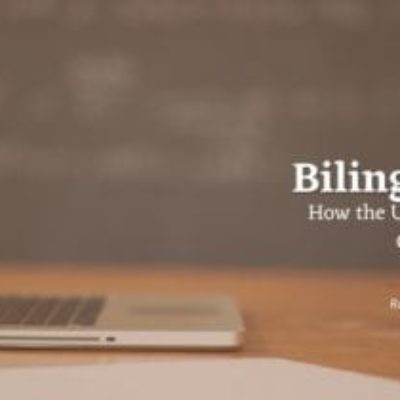
Why Bankers Should Learn Spanish
Understanding the American banking system is complicated –even to English speakers who are reading English documents. Banking and lending institutions, along with credit card companies, make it so darn confusing to understand their jargon that it takes research and good guidance (albeit from someone who has your best interest in mind) to understand what is being said and the implications of the contract.
Successful bankers look for ways to broaden the market. It is evident that non-English speaking persons are underserved in this sector. If you want to expand your business and serve new markets, then learning another language and being able to explain complicated banking terminology is key.
Limited-English-Proficiency (LEP) Populations are Underserved
When a market is underserved, that means there’s an opportunity. According to the US Census Bureau, as of July 2018, 18.1% of Americans are of Hispanic or Latino descent, and there are 41 million native Spanish speakers in the USA.
Learning Spanish will help you serve this vast population.
For years, the United States Government has been receiving reports and complaints from non-governmental organizations and both private and governmental sectors that people who don’t speak English well, or at all, are negatively impacted when conducting financial affairs. Evidence has indicated that limited English has a direct relationship with limited financial literacy.
This means millions of people are unable to make informed money management decisions and cannot effectively take proactive measures for their current and future financial health. It is crucial for everyone to understand their finances.
Some steps have been taken to reduce deceptive and abusive practices by the financial institutions, but more can be done.

A Step in the Right Direction
As an example, The Credit Card Act of 2009 was passed by the United States Congress in 2009 and took effect in 2010. This act directed credit card companies to make their statements more understandable with clearer disclosures about how to pay your bill on -time and the consequences if you don’t.
As part of the act, The US Government Accountability Office (GAO) was mandated to examine the relationship between fluency in the English language and financial literacy. Is there a disadvantage for non-English speakers in the US Banking System?
The study found that:
· translated financial materials may not be using colloquial or culturally appropriate language.
· Interpreters don’t always fully understand banking information or are not able to explain the material. Often times, assistance is provided from families’ minor children.
· Immigrants may distrust the U.S. financial system since it is different than their native country; therefore, they are more likely to use alternative financial services – such as payday lenders and check-cashing services – that often have unfavorable fees, terms, and conditions.
· Carrying debt can be viewed negatively, which deters some people from taking loans to purchase homes or cars and building credit histories.
· Limited English language skills may make one more susceptible to fraudulent and predatory practices.
We want to do business with those we like and trust, and we build these things through communication.
Opportunities Exist for Bankers
Since a limited number of bankers speak Spanish, families often rely on their young children to interpret complicated finance matters for them. This, compounded with the fact that some cultures mistrust government and banking institutions, leaves a large gap in potential home-buyers, responsible loan paybacks, and other banking relationships.
The US Latino market is a growing driving force in the US economy. Millions of people are building businesses, buying homes, and purchasing cars, which means they require financial assistance. If trust isn’t built and information isn’t shared between bankers and the Latino community, then the gap will continue to grow.
Did you know the Consumer Financial Protection Bureau monitors unfair practices, and as a result, deters most US banks from even advertising in Spanish? This is because if companies advertise in Spanish to attract new customers, then they need to offer 100% support throughout the entire process (cradle to grave) in Spanish – and most can’t do that…yet.
There’s No Time like Now
Latinos are underrepresented in banking and therefore seek out information from family first and advertising second. Their families are oftentimes not properly informed, and advertisements are mostly in English, causing people to feel confused and uneducated about the banking process.
Research shows that Latinos have a great interest in gaining access to more banking information in Spanish, such as:
· Latinos are 2x more likely than non-Hispanics to be interested in financial service ads
· 73% of Latinos think more commercials should be directed to Spanish-speakers
· 88% of Latinos think companies who make an effort deserve their loyalty
· 30% of Latinos would switch banks if Spanish mobile apps were available
Don’t Delay
What are you waiting for? Here is your chance to help an underserved community!
Expand your horizons today and take a free Spanish class with a native Spanish-speaking teacher in Antigua, Guatemala. Our excellent teachers can answer any questions you have of the Spanish-language banking system they use and how it directly benefits them!

Want more free Spanish resources? Check these out!
- Celebrating Culture and Joy: The Magic of Carnival in Spanish-Speaking Countries
- 15 Mouth-Watering National Dishes of Latin America
- Discovering The Mayan Languages
- The 10 Most Common Spanish Surnames in The U.S
- Everything About Mexican Christmas Traditions
- What Is the Hispanic Scholarship Fund? Is It Legit?
- A Spanish Guide to Thanksgiving Food Vocabulary
- How Did All Saints Day Celebrations Started?
- 15 Super Popular Spanish Songs for Kindergarten - January 24, 2023
- 11 Native Spanish Shows on Netflix for Teenagers (14+) - April 6, 2021
- The Life and History of Latino Soccer Star Diego Maradona - March 11, 2021




